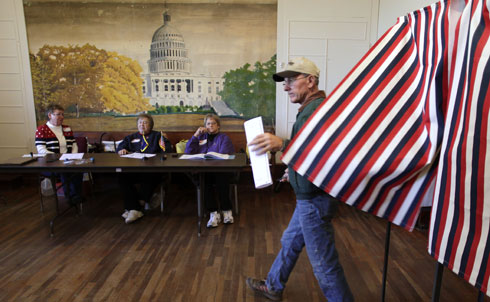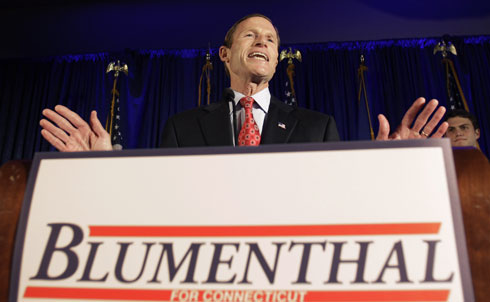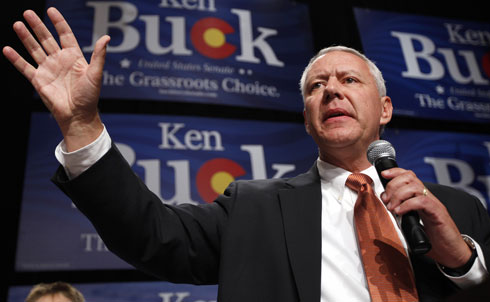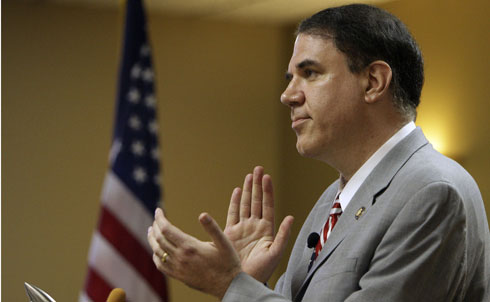
Democrats suffered big losses last night, ceding more seats than either party had lost in midterm elections since Franklin Roosevelt. Republicans now have control of the House, and while Democrats still hold the Senate, they no longer have a supermajority. While voters sent home some high-profile progressive members of Congress—Russ Feingold, Tom Perriello, and Alan Grayson—fully half of conservative Democrats were voted out of office. The election’s biggest winners and losers—in the Senate and the House, plus ballot initiatives—follow.
Credit: AP Images

Senate Majority Leader Harry Reid narrowly won re-election in Nevada, beating Tea Party candidate Sharron Angle. As recently as early October, Angle, who supports eliminating Social Security and challenges the separation of church and state, was leading. As Democrats managed to keep control of the Senate, Reid will remain Majority Leader.
Credit: AP Images

In Connecticut, the state’s Attorney General, Democrat Richard Blumenthal, won a Senate seat over Linda MacMahon, former World Wrestling Entertainment CEO, 54 to 44 percent.
Credit: AP Images

Delaware Tea Party candidate Christine O’Donnell’s bid for a Senate seat may have drawn tons of press, but her opponent, Chris Coons, beat her easily. O’Donnell, backed by Sarah Palin, waged a successful primary challenge to Republican Rep. Mike Castle. Pundits argue that that Senate seat would have gone Republican had the party put forward a less extreme candidate.
Credit: AP Images

Colorado’s Senate race was just called for Democrat Michael Bennet. His opponent Ken Buck, hard-line anti-immigrant Republican, endorsed (and later un-endorsed) the state’s proposed Amendment 62, which would have established fetal personhood. Buck also memorably suggested voters should choose him because he doesn’t "wear high heels" and refused, as District Attorney, to prosecute a rape case.
Credit: Reuters Pictures

Progressives suffered a bitter defeat in Sen. Russ Feingold’s narrow loss to Republican Ron Johnson in Wisconsin. Feingold is a staunch supporter of civil liberties—the only Senator to oppose the Patriot Act—and has been a longtime advocate for reproductive and gay rights.
Credit: AP Images

Florida Rep. Alan Grayson served in Congress for only one term, but his 56-to-38-percent loss to Dan Webster is also a hard one to take. Grayson pulled no punches in talking back to the GOP. Mark Pinsky described Grayson as "an unapologetic man of the left—or as he describes himself, a democratic populist. He opposes the wars in Iraq and Afghanistan (each ‘a foreign occupation’) and supports abortion rights, gay marriage, bilingual programs, unions, middle-class tax cuts and comprehensive, single-payer healthcare. The son of two New York City teachers union activists, he defended the embattled, now-defunct community organization ACORN on the floor of Congress, calls Arizona’s immigration law ‘racist’ and declines to join the periodic attacks on Venezuelan strongman Hugo Chávez. Congress has not seen his like since firebrand Vito Marcantonio represented Harlem during the cold war."
Credit: AP Images

Libertarian-leaning Tea Party candidate Rand Paul won a Senate seat in Kentucky, beating Democrat Jack Conway 55 to 44 percent. Paul maintains plenty of positions that aren’t Republican orthodoxy—he says he would have voted against the Iraq war, criticizes the Patriot Act and supports decreasing penalties for marijuana possession—so now the question is: will he fall in line with the Republican caucus, or become a thorn in their side?
Credit: AP Reuters

Another painful loss for progressives is Virginia Rep. Tom Perriello, who won his seat in a hard-fought race against a Republican incumbent just two years ago. Despite being in a historically-conservative district, Perriello supported healthcare reform and introduced a bill that would have applied anti-trust law to the business of health insurance. Perriello will be replaced by Republican Robert Hurt.
Credit: AP Images

In the race for late Sen. Robert Byrd’s West Virginia Senate seat, Democratic Gov. Joe Manchin beat self-described "conservative businessman" John Raese. In Pennsylvania, Joe Sestak, who ousted longtime-Republican-turned-Democrat in the Democratic primary, narrowly lost to Republican Pat Toomey.
Credit: AP Images

Two California ballot initiatives went down yesterday—Prop 19, which would have legalized marijuana possession, fell short 54 to 46 percent, while an attempt to repeal the state’s Global Warming Solutions Act, Prop 23, suffered a big loss. Prop 23 would have suspended the state’s strict emissions limits until the unemployment rate fell to 5.5% or below for four consecutive quarters, but since the unemployment rate has only been that low three times in 30 years, critics argued the suspension would amount to a repeal. Plus, Prop 23 would have cut green jobs spending, increasing unemployment at least in the short term, and was heavily backed by Texas-based oil companies.
Colorado’s Amendment 62, which would have established fetal personhood, was roundly defeated, 70 to 29 percent. That’s great news, but the bad news is that a comparable amendment was on the ballot in 2008, and lost by a huge margin then, too. Will anti-choice forces in Colorado drain progressives’ resources fighting a similar amendment again in two years? Meanwhile, Oklahoma voters outlawed the use of sharia law in state courts—70 to 30 percent.
Credit: Reuter Pictures

Results for Colorado’s initiative to block healthcare mandates are still too close to call, but a similar proposal won in other states—resoundingly in Oklahoma (64 to 35 percent) and by ten points in Arizona (55 to 44 percent). Those proposals won’t have a concrete effect unless the healthcare bill is repealed or found unconstitutional, but they throw obstacles in its path.
Credit: Reuters Pictures


